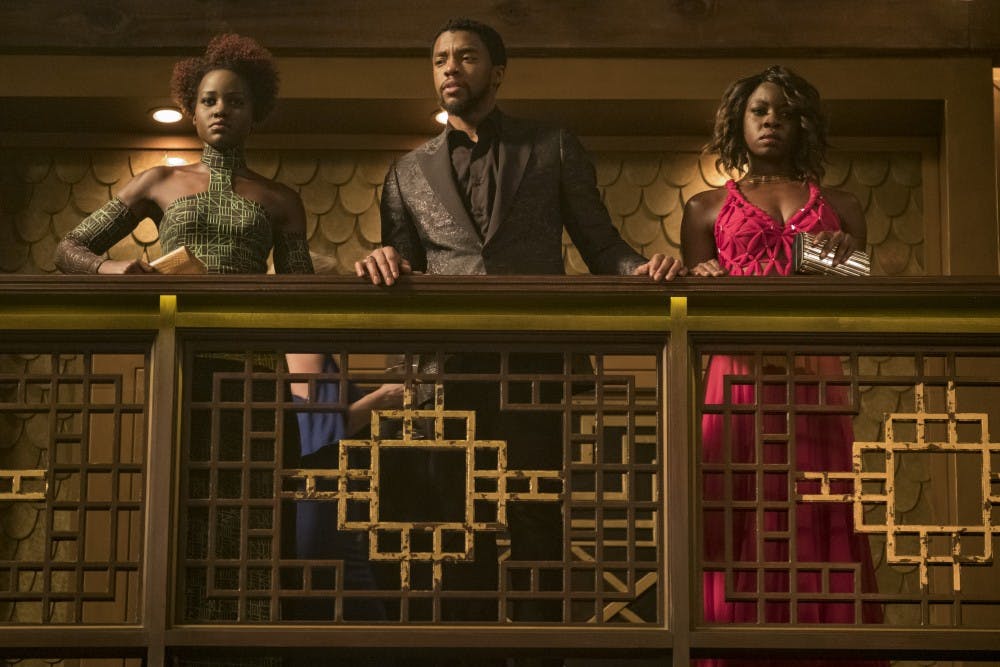Weeks after hitting theaters, audiences’ love for Director Ryan Coogler’s “Black Panther” is still going strong: the film has made over $520 million domestically, making the list of top 10 highest-grossing films in the United States of all time.
The film received praise for its positive representation of race, gender and culture. One of the major elements audience members took notice of was the fashion in the film, which was inspired by traditional and contemporary African culture from around the continent, according to an Atlantic article.
Seeing familiar clothing items and patterns from her home country shown on screen felt “amazing,” said Amanda Nyang'oro, AU’s African Student Organization 2018 queen from Tanzania.
“It felt like you were home,” Nyang'oro said. “I could see this was a real interpretation; you could really tell they did their research.”
Costume Designer Ruth Carter blended ancient styles with a futuristic twist to create many costumes in the film, according to Vanity Fair. When designing these and other ensembles, Carter looked to various African tribes, the comic book and experts for inspiration.
Many fans dressed up in Wakanda-inspired African clothing when seeing the movie in theaters.
Seeing black people “show out” in appreciation of the film was beautiful and inspiring, Nyang'oro said. However, it’s important for people to realize Wakanda is fictional and understand that information was taken from different places in Africa in order to create it, she said.
“The issue comes in where people are like, ‘Oh, now Africa’s cool because of this movie,’ when really, we were always cool,” Nyang'oro said. “It’s just that you guys are now understanding because you see it on a big screen.”
Leanna Faulk, head of public relations in AU’s Black Student Union, is of Afro-Caribbean descent. Although she isn’t as familiar with her African heritage, seeing the fashion and styles represented in “Black Panther” made her want to learn more about her family’s specific cultures within the continent, she said.
“It definitely made me want to know what tribe that I’m from and which country so I could know in the movie which outfits were inspired by my culture,” Faulk said.
Fashion is multidimensional and is meant to be appreciated by everyone regardless of their nationality, Faulk said. While watching a two-and-a-half hour movie alone won’t help viewers fully understand the continent of Africa, Faulk said that people can show their appreciation through their own research.
“I feel like if you aren’t directly in touch with your African culture or if you’re not even a part of the African/black community, you should still research the garments that you choose to be wearing,” Faulk said. “A lot of African fashion comes with a lot of history and heavy material sometimes.”
Anthony Mensah, BSU content creator, is of Ghanaian descent. Although he doesn’t expect people to write a 20-page research paper on their outfit of choice, Mensah said asking questions to understand what and why you choose to wear something is crucial in order to truly experience it.
“It’s like, if I put on an outfit, what region did it come from?” Mensah said. “Why did I choose to wear that? If there’s symbols on it, what do they mean? What part of African heritage am I trying to embody?”
However, Mensah said that he can’t fault someone entirely for wearing something without knowing its exact history, especially since African-Americans had their culture stripped from them during slavery and were forced to build it back up from nothing.
“I can’t be mad at you for not knowing everything about everything, because no one knows everything about everything,” Mensah said.
People should be able to participate in the culture without having to grow up in the continent, but it shouldn’t be reckless so as not to offend others, he said.
Since the film’s release, many have rushed to African-clothing stores around the country, leading to an increase in sales.
The film gave many black people in America who don’t know their specific ancestry a chance to be proud of their African heritage through fashion, Nyang'oro said. Because the film is deeply rooted in culture, wearing inspired-outfits extend beyond Marvel cosplay.
“You might say, ‘I’m wearing this because it’s inspired by Black Panther’s Wakandians’ … but realize that these things that you’re wearing come from real places,” Nyang'oro said. “When you’re wearing that dashiki or that headwrap or the accessories on your neck or your wrist … you have to be aware of what you put on your body and not just see it as a costume.”





